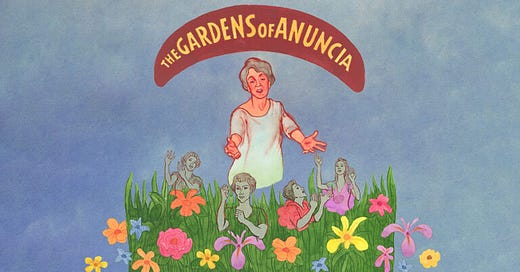"THE GARDENS OF ANUNCIA:" A Choreographer Sings
I rather like the idea of musicals about choreographers’ lives. Why not get to know the mover behind the moves? Why not sing and dance their story?
Bob Fosse’s story we’ve all been through by now, for example, but imagine the choreography he might have come up with to tell that story in a musical. Michael Bennett, too, lived a helluva life. I can almost imagine the movement he might have made of it.
Then again, shards of choreographers’ lives must flash through their choreography inescapably. All we have to do is know where to look.
These musings are triggered by The Gardens of Anuncia, a new musical in its last week at Lincoln Center Theater about the early life of choreographer-director Graciela Daniele, whose contributions to musicals like Ragtime, The Pirates of Penzance, Once on this Island, I happily kind of grew up on, including the many Ms. Daniele created at Lincoln Center Theater, where she was the first ever director-in-residence. Born in Argentina, Ms. Daniele’s childhood has the makings of a Marquez novel, or a Lorca poem. Composer Michael John LaChiusa, her longtime collaborator, mines it for its richness of spirit, rather than the turgid melodrama it also comprises. As a story in movement, it left me wanting more; much more. As a musical, I found it light, and frequently lilting.
The Gardens of Anuncia sings about three powerful women: Ms. Daniele’s mother, grandmother and aunt — “Mami,” “Granmama” and “Tia” — who raised her in Buenos Aries, fatherless, during the perilous Perón years. These indomitable ladies are played by three formidable forces of musical theater, respectively: Eden Espinosa, Mary Testa and Andréa Burns, whose voices ring out, alone and apart, in this memory play of a musical. Their interaction is The Gardens of Anuncia’s essence; the two sisters, Mami and Tia, each dissatisfied in different ways, and Granmama, deeply satisfied in a surprising way.
Where they are singularly united is in their devotion to young Anuncia (a lithe Kalyn West), the kid who will become Graciela Daniele. They protect her and inspire her to become the dancer she dreams of being. The music Mr. LaChiusa has given them is just about the most approachable of his career. Little of it is challenging or adventurous, in the sense of his early musicals —Hello Again, Marie Christine (both of which Ms. Daniele directed and choreographed at LCT), or The Wild Party or First Lady Suite — musicals I spent a fair amount of time documenting (and admiring) once upon a time. (LaChiusa gets his own chapter in my book, EVER AFTER.)
The score he has created for The Gardens of Anuncia is tango-centric, unsurprisingly, yet childlike, also unsurprisingly — this is an adult’s childhood memory after all. Even when conjuring danger, the music maintains a kind of preciousness that cedes it of some drama.
I wish the music was a bit more complex. I wish the dances were too. I wish the musical was, in fact, danced more. There is a lot of talk, scripted by Mr. LaChiusa. Little of it is necessary. Ms. Daniele (beyond her youthful self), also appears as a character herself now (Older Anuncia), handsomely brought to life by the great Priscilla Lopez, who is given far too little to do here, except wander through her garden and reminisce. One of our greatest alums of A Chorus Line should have been provided a movement vocabulary all her own.
Most everything Ms. Lopez says to us, as Graciela Daniele, is self-deprecating and reticent. The choreography in The Gardens of Anuncia seems similarly reticent. The women move touchingly together, weaving steps like the harmonies they vocalize. None of them are dancers, first, but compelling singers vocalizing a dancer’s story. This seems an odd way for a choreographer’s story to be told.
My friend (full disclosure) Mary Testa delivers another of her searingly enthralling performances as a grandmother who is not simply a fount of grandmotherly wisdom, but an object lesson in counter-intuitive late-life contentment and sexual gratification. Her husband has spent their marriage mostly off at sea. This is just where she prefers him to be. When he does come home, though, their reuniting is always hot! I really loved Granmama.
Two talented male actors, Enrique Acevedo and Tally Sessions, are given a great deal of background work as a variety of mostly male characters in counterpoint to the women, including Granpapa (and one hilariously voluble deer). They are splendid, lusty, and often hysterical.
Ms. Daniele grew up to become a Bob Fosse dance captain and a Michael Bennett assistant, during her luminous career as a Broadway dancer, before following in her mentors’ footsteps as a director-choreographer. I seriously doubt either of those guys would have been as modest about their own lives as she is about hers in this musical. But then again, they were guys, and Ms. Daniele, blessedly, is not. The Gardens of Anuncia is a love letter to nurturing women. It is atmospheric and gentle as a breeze off the Río de la Plata. As a choreographer’s musical life story, it sings sweetly, but I can’t help wondering, why stop there?




